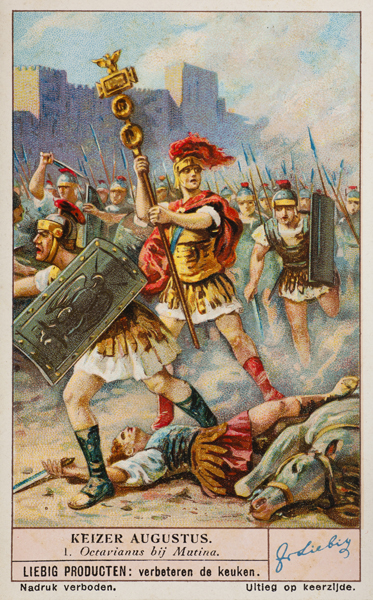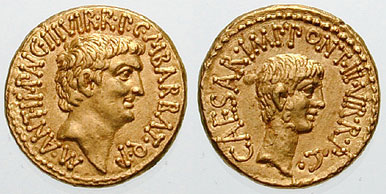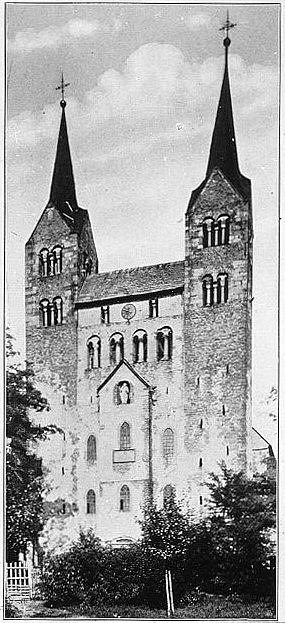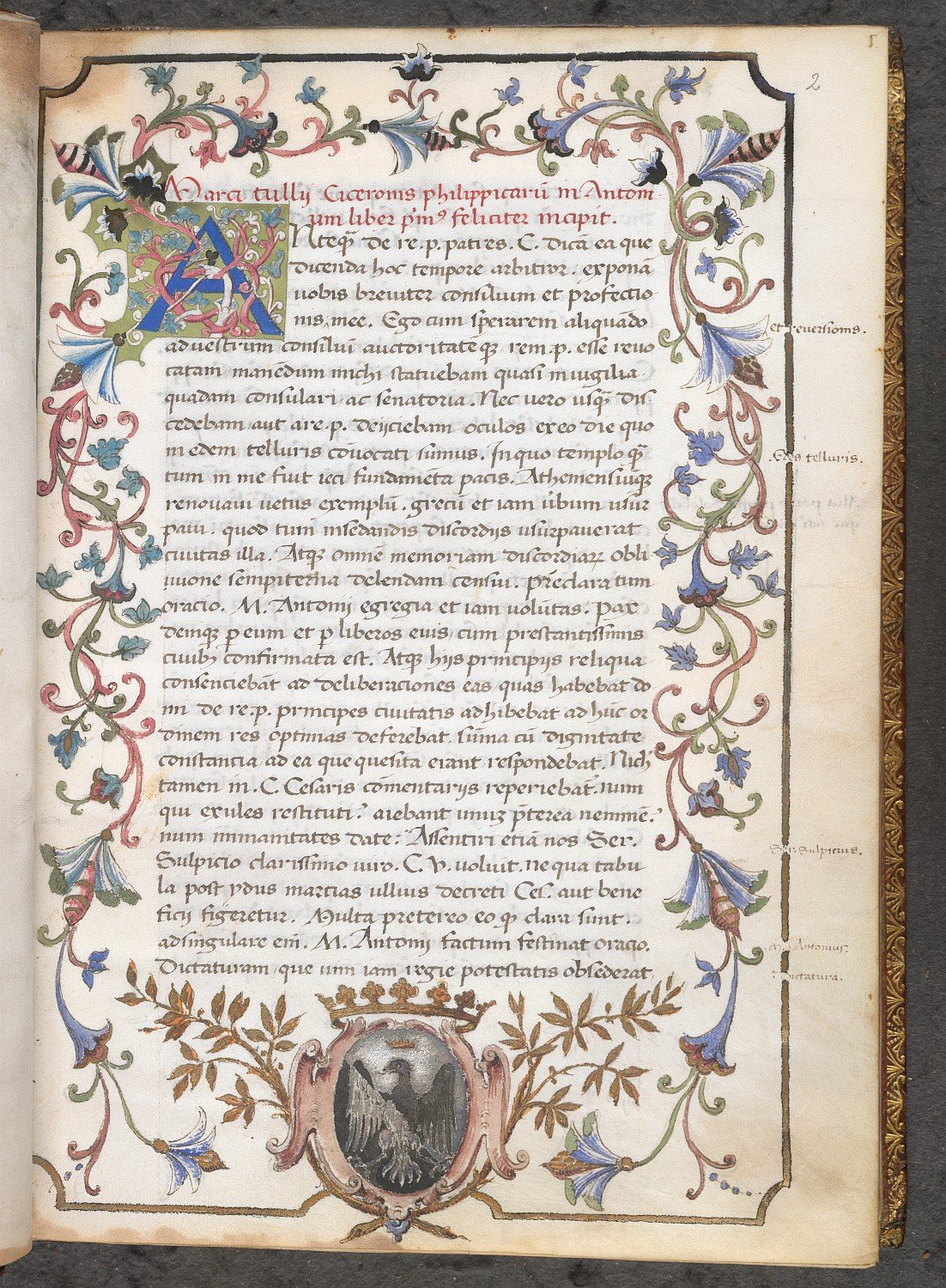|
Battle Of Mutina
The Battle of Mutina took place on 21 April 43 BC between the forces loyal to the Roman Senate, Senate under consuls Gaius Vibius Pansa and Aulus Hirtius, supported by the forces of Augustus, Caesar Octavian, versus the forces of Mark Antony which were besieging the troops of Decimus Junius Brutus Albinus, Decimus Brutus. The latter, one of Caesar's assassins, held the city of Mutina (present-day Modena) in Cisalpine Gaul. Six days earlier, the Battle of Forum Gallorum had ended with heavy losses on both sides and the mortal wounding of consul Pansa. Hirtius and Octavian then launched an attack on Antony's camp, seeking to break the siege. Amid bloody fighting, Hirtius was killed, leaving the army and republic leaderless. Octavian saw action in the battle, recovered Hirtius' body, and managed to avoid defeat. Decimus Brutus also participated in the fighting with part of his forces locked up in the city. Command of Hirtius' legions then devolved to Caesar Octavian. Decimus Brut ... [...More Info...] [...Related Items...] OR: [Wikipedia] [Google] [Baidu] [Amazon] |
War Of Mutina
The War of Mutina (December 44 – April 43 BC; also called the Mutina war) was a civil war between the Roman Senate and Mark Antony in Northern Italy. It was the first civil war after the assassination of Julius Caesar. The main issue of the war was attempts by the Senate to resist Antony's forceful assumption of the strategically important provinces of Transalpine Gaul, Transalpine and Cisalpine Gaul from their governors. The Senate, led by Cicero and the consuls (Aulus Hirtius and Gaius Vibius Pansa Caetronianus, Gaius Vibius Pansa), attempted to woo Julius Caesar's heir (today known in this period as Octavian) to fight against Antony. Octavian, however, would pursue his own agenda. The consuls, with Octavian, led troops into northern Italy against Antony and won two battles at Battle of Forum Gallorum, Forum Gallorum and Battle of Mutina, Mutina (14 and 21 April 43 BC). After the two consuls were mortally wounded at those battles, there emerged a political vacuum. O ... [...More Info...] [...Related Items...] OR: [Wikipedia] [Google] [Baidu] [Amazon] |
Shepherd Map Regio Aemilia (1911)
A shepherd is a person who tends, herds, feeds, or guards flocks of sheep. Shepherding is one of the world's oldest occupations; it exists in many parts of the globe, and it is an important part of Pastoralism, pastoralist animal husbandry. Because the occupation is so widespread, many religions and cultures have symbolic or metaphorical references to shepherds. For example, Jesus called himself the Good Shepherd, and ancient Greek mythologies highlighted shepherds such as Endymion (mythology), Endymion and Daphnis. This symbolism and shepherds as characters are at the center of pastoral literature and art. Origins Shepherding is among the oldest occupations, beginning some 5,000 years ago in Asia Minor. Sheep were kept for their milk, their sheep meat, meat and especially their wool. Over the next thousand years, sheep and shepherding spread throughout Eurasia. Henri Fleisch tentatively suggested that the Shepherd Neolithic industry (archaeology), industry of Lebanon m ... [...More Info...] [...Related Items...] OR: [Wikipedia] [Google] [Baidu] [Amazon] |
Gallia Narbonensis
Gallia Narbonensis (Latin for "Gaul of Narbonne", from its chief settlement) was a Roman province located in Occitania and Provence, in Southern France. It was also known as Provincia Nostra ("Our Province"), because it was the first Roman province north of the Alps, and as Gallia Transalpina ("Transalpine Gaul"), distinguishing it from Cisalpine Gaul in Northern Italy. It became a Roman province in the late 2nd century BC. Gallia Narbonensis was bordered by the Pyrenees Mountains on the west, the Cévennes to the north, the Alps on the east, and the Gulf of Lion on the south; the province included the majority of the Rhone catchment. The western region of Gallia Narbonensis was known as Septimania. The province was a valuable part of the Roman Empire, owing to the Greek colony and later Roman Civitas of Massalia, its location between the Spanish provinces and Rome, and its financial output. Names The province of ''Gallia Transalpina'' ("Transalpine Gaul" ... [...More Info...] [...Related Items...] OR: [Wikipedia] [Google] [Baidu] [Amazon] |
Battle Of Gergovia
The Battle of Gergovia took place in 52 BC in Gaul at Gergovia, the chief oppidum (fortified town) of the Arverni. The battle was fought between a Roman Republican army, led by proconsul Julius Caesar, and Gallic forces led by Vercingetorix, who was also the Arverni chieftain. The Romans attempted to besiege Gergovia, but miscommunication ruined the Roman plan. The Gallic cavalry counterattacked the confused Romans and sent them to flight, winning the battle. The site is identified with Merdogne, since renamed Gergovie, a village located on a hill within the town of La Roche-Blanche, near Clermont-Ferrand, in south central France. Some walls and earthworks still survive from the pre-Roman Iron Age. The battle is well known in France as an example of a Gallic victory. Prelude As with much of the conflict between Rome and Gaul in the first century BC, information about this battle comes principally from Julius Caesar's '' Commentaries on the Gallic War'' (). There are no s ... [...More Info...] [...Related Items...] OR: [Wikipedia] [Google] [Baidu] [Amazon] |
Macedonia (Roman Province)
Macedonia (; ) was a province of ancient Rome, encompassing the territory of the former Antigonid Kingdom of Macedonia, which had been conquered by the Roman Republic in 168 BC at the conclusion of the Third Macedonian War. The province was created in 146 BC, after the Roman general Quintus Caecilius Metellus defeated Andriscus of Macedon, the last self-styled King of Macedonia in the Fourth Macedonian War. The province incorporated the former Kingdom of Macedonia with the addition of Epirus, Thessaly, and parts of Illyria, Paeonia and Thrace. During the Republican period, the province was of great military significance, as the main bulwark protecting the Aegean region from attacks from the north. The Via Egnatia, which crossed the province from west to east was of great strategic importance, providing the main overland link between Rome and its domains in the Eastern Mediterranean. In this period, campaigns against the Dardani and Scordisci to the north and the Thracians ... [...More Info...] [...Related Items...] OR: [Wikipedia] [Google] [Baidu] [Amazon] |
Annals (Tacitus)
The ''Annals'' () by Roman historian and senator Tacitus is a history of the Roman Empire from the reign of Tiberius to that of Nero, the years AD 14–68. The ''Annals'' are an important source for modern understanding of the history of the Roman Empire during the 1st century AD. Tacitus' final work, modern historians generally consider it his magnum opus which historian Ronald Mellor says represents the "pinnacle of Roman historical writing". Tacitus' ''Histories'' and ''Annals'' together amounted to 30 books, although some scholars disagree about which work to assign some books to, traditionally 14 are assigned to ''Histories'' and 16 to ''Annals''. Of the 30 books referred to by Jerome about half have survived. Modern scholars believe that as a Roman senator, Tacitus had access to '' Acta Senatus''—the Roman senate's records—which provided a solid basis for his work. Although Tacitus refers to part of his work as "my annals", the title of the work ''Annals'' used tod ... [...More Info...] [...Related Items...] OR: [Wikipedia] [Google] [Baidu] [Amazon] |
Tacitus
Publius Cornelius Tacitus, known simply as Tacitus ( , ; – ), was a Roman historian and politician. Tacitus is widely regarded as one of the greatest Roman historians by modern scholars. Tacitus’ two major historical works, ''Annals'' (Latin: ) and the ''Histories'' (Latin: ), originally formed a continuous narrative of the Roman Empire from the death of Augustus (14 AD) to the end of Domitian’s reign (96 AD). The surviving portions of the Annals focus on the reigns of Tiberius, Claudius, Nero, and those who reigned in the Year of the Four Emperors (69 AD). Tacitus's other writings discuss oratory (in dialogue format, see ), Germania (in ''De origine et situ Germanorum''), and the life of his father-in-law, Agricola (the general responsible for much of the Roman conquest of Britain), mainly focusing on his campaign in Britannia ('' De vita et moribus Iulii Agricolae''). Tacitus's ''Histories'' offers insights into Roman attitudes towards Jews, ... [...More Info...] [...Related Items...] OR: [Wikipedia] [Google] [Baidu] [Amazon] |
Suetonius
Gaius Suetonius Tranquillus (), commonly referred to as Suetonius ( ; – after AD 122), was a Roman historian who wrote during the early Imperial era of the Roman Empire. His most important surviving work is ''De vita Caesarum'', commonly known in English as '' The Twelve Caesars'', a set of biographies of 12 successive Roman rulers from Julius Caesar to Domitian. Other works by Suetonius concerned the daily life of Rome, politics, oratory, and the lives of famous writers, including poets, historians, and grammarians. A few of these books have partially survived, but many have been lost. Life Gaius Suetonius Tranquillus was probably born about AD 69, a date deduced from his remarks describing himself as a "young man" 20 years after Nero's death. His place of birth is disputed, but most scholars place it in Hippo Regius, a small north African town in Numidia, in modern-day Algeria. It is certain that Suetonius came from a family of moderate social position, that his fat ... [...More Info...] [...Related Items...] OR: [Wikipedia] [Google] [Baidu] [Amazon] |
Lucius Pontius Aquila
Pontius Aquila (possibly Lucius Pontius; died 21 April 43 BC) was a Roman politician, military commander, and one of the assassins of Julius Caesar. In 45 BC, as tribune of the plebs, he annoyed Caesar by refusing to stand during his triumphal procession, and, in the following year, joined the conspiracy to kill the dictator. Aquila died fighting at the Second Battle of Mutina against Mark Antony in April 43 BC, before the formation of the Second Triumvirate later that year. Life Pontius Aquila probably belonged to an undistinguished family from Sutrium in southern Etruria. He seems to have been a committed republican and opponent of Julius Caesar from the start, and probably supported Caesar's enemy Pompey in the civil war which began in 49 BC. In 45 BC, during Caesar's dictatorship, he was tribune of the plebs, and at Caesar's triumph in October, Aquila did not, unlike the other tribunes, stand up in honor as the procession passed by. This irritated Caesar so much, he c ... [...More Info...] [...Related Items...] OR: [Wikipedia] [Google] [Baidu] [Amazon] |
Appian
Appian of Alexandria (; ; ; ) was a Greek historian with Roman citizenship who prospered during the reigns of the Roman Emperors Trajan, Hadrian, and Antoninus Pius. He was born c. 95 in Alexandria. After holding the senior offices in the province of Aegyptus (Egypt), he went to Rome c. 120, where he practiced as an advocate, pleading cases before the emperors (probably as ''advocatus fisci'', an important official of the imperial treasury). It was in 147 at the earliest that he was appointed to the office of procurator, probably in Egypt, on the recommendation of his friend Marcus Cornelius Fronto, an influential rhetorician and advocate. Because the position of procurator was open only to members of the equestrian order (the "knightly" class), his possession of this office tells us about Appian's family background. His principal surviving work (Ρωμαϊκά ''Romaiká'', known in Latin as ''Historia Romana'' and in English as ''Roman History'') was written in Greek i ... [...More Info...] [...Related Items...] OR: [Wikipedia] [Google] [Baidu] [Amazon] |
Imperator
The title of ''imperator'' ( ) originally meant the rough equivalent of ''commander'' under the Roman Republic. Later, it became a part of the titulature of the Roman Emperors as their praenomen. The Roman emperors generally based their authority on multiple titles and positions, rather than preferring any single title. Nevertheless, ''imperator'' was used relatively consistently as an element of a Roman ruler's title throughout the Principate and the later Roman Empire. It was abbreviated to "IMP" in inscriptions. The word derives from the stem of the verb , meaning 'to order, to command'. The English word ''emperor'' derives from ''imperator'' via . ''Imperatores'' in the ancient Roman Kingdom When Rome was ruled by kings, to be able to rule, the king had to be invested with the full regal authority and power. So, after the comitia curiata that was held to elect the king, the king also had to be conferred the imperium. ''Imperatores'' in the Roman Republic In Roma ... [...More Info...] [...Related Items...] OR: [Wikipedia] [Google] [Baidu] [Amazon] |
Philippicae
The ''Philippics'' () are a series of 14 speeches composed by Cicero in 44 and 43 BC, condemning Mark Antony. Cicero likened these speeches to those of Demosthenes against Philip II of Macedon; both Demosthenes' and Cicero's speeches became known as Philippics. Cicero's Second Philippic is styled after Demosthenes' '' On the Crown''. The speeches were delivered in the aftermath of the assassination of Julius Caesar, during a power struggle between Caesar's supporters and his assassins. Although Cicero was not involved in the assassination, he agreed with it and felt that Antony should also have been eliminated. In the ''Philippics'', Cicero attempted to rally the Senate against Antony, whom he denounced as a threat to the Roman Republic. The ''Philippics'' convinced the Senate to declare Antony an enemy of the state and send an army against him. However, the commanders were killed in battle, so the Senate's army came under the control of Octavian. When Octavian, Antony and ... [...More Info...] [...Related Items...] OR: [Wikipedia] [Google] [Baidu] [Amazon] |









